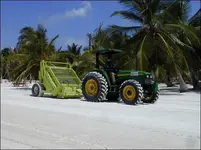Cocoa beach and Cape Canaveral bought the 600HD rakes for beach clean up.
I haven’t seen them yet and they might have something different for the nesting areas.
Here is a video of the rakes they bought.
http://wms17.streamhoster.com/hbarber/Surf Rake.wmv
Also the article in Florida Today.
COCOA BEACH - The purchase of a mechanical beach-raking machine by Cocoa Beach and Cape Canaveral has been approved, with delivery expected next month.
It is expected to make its first clean sweep of both community beachfronts soon after that.
The machine is a 600HD Surf Rake made by the Barber and Sons Co. of Connecticut.
The cities had to choose from many other types of machines.
It is built to clean eight acres an hour, clearing a seven-foot- wide path with each pass and capable of holding 3,700 pounds in its hopper.
The $81,681 cost will be spilt between the two cities and the Tourist Development Board.
Included in the cost is a tractor designed to pull it.
The machine can handle all types of discarded material, especially hard-to-get cigarette butts. Those have been a particular concern in Cocoa Beach, where a move to ban smoking on beaches was rejected.
Since then, special trash cans and bags have been made available, but have made a minor dent in the problem.
Cape Canaveral Mayor Rocky Randels thanked Cocoa Beach leaders for leading the project.
Randels said another problem on the beaches is endangered sea turtles nesting in both areas.
This problem mainly includes the loggerheads that make their nesting site here from May to November, he said.
"However, it is my understanding that with the guidance and approval of the Department of Environmental Protection, we will be able to proceed cleaning all the sandy areas between the water and the dune lines, which is where most people sunbathe, and not where the turtles usually lay their eggs," Randels said.
He said the Space and Treasure coasts are home to many green turtles.
Randels said that beach cleaning was largely done by volunteers before.
The new machine will also scoop up dead fish washed ashore as a result of red tides or storms.





